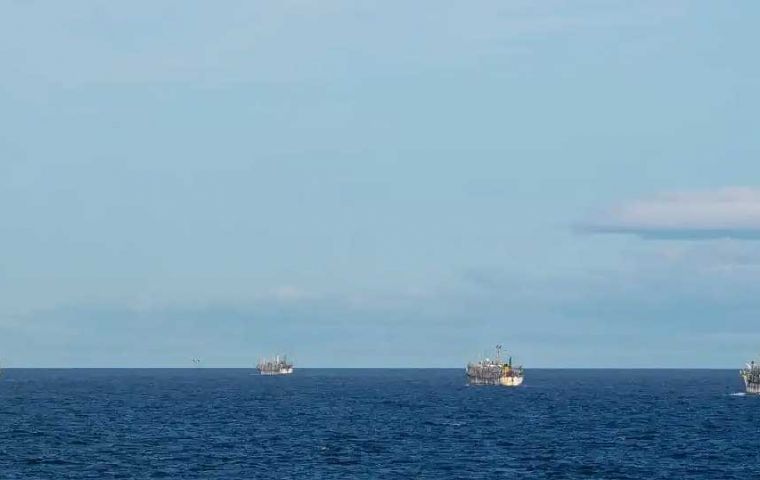MercoPress. South Atlantic News Agency
Chinese fishing near Chilean waters on the rise?
 China's Embassy in Santiago denied the allegations
China's Embassy in Santiago denied the allegations The Chilean Navy has detected a significant surge in activity by Chinese-flagged fishing vessels operating near the country's Exclusive Economic Zone (EEZ), prompting concerns about potential illegal, unreported, and unregulated (IUU) fishing.
In a document delivered to the Congressional Committee on Fisheries, Aquaculture, and Maritime Interests, the Navy revealed it has inspected 117 Chinese vessels in 2025 alone, a dramatic increase compared to just five vessels inspected in 2023 and eight in 2024.
Rear Admiral Sigfrido Ramírez, Director of Maritime Security and Operations, told the committee that while international fleets have operated near the EEZ since the 1990s, “Today we are seeing more intense activity, with greater technology and a sustained presence.”
The vessels detected include a jigging fleet of approximately 229 vessels, predominantly Chinese, dedicated to red squid fishing. At least 95 of these are operating off the coast of Iquique, and the Navy has registered eight incursions within the Chilean EEZ.
Chile's National Fisheries and Aquaculture Service (Sernapesca) confirmed that the pressure from international fleets is intensifying. Between 2024 and 2025, Chile received 175 requests for port access, 83% of them from Chinese vessels.
María Soledad Tapia, National Director of Sernapesca, noted that 11% of those requests were rejected due to inconsistencies or lack of information, acknowledging that “the challenge of enforcement is becoming increasingly complex.”
Rear Admiral Ramírez stressed that the growing fleets pose a scenario of high logistical and technological demands for the Navy, whose monitoring system covers over 26 million square kilometers.
Environmental organizations and experts have warned that Chile lacks the resources and regulations to effectively manage the escalating presence.
César Astete, director of fishing campaigns at Oceana Chile, called for “more resources, more transparency, and an urgent update of regulations.”
Proposals emerging from the congressional committee include a review of current maritime legislation, an increased budget for the Navy and Sernapesca, and the periodic publication of foreign vessel control reports.
In response, the Chinese Embassy in Santiago issued a statement defending its fleet. The diplomatic mission asserted that China was a responsible fishing country that strictly complies with its obligations and strengthens the supervision of deep-sea fishing by requiring vessels to report their position hourly—a frequency higher than international standards.
The embassy emphasized that Chilean maritime and fisheries authorities have monitored and inspected vessels requesting port access and found “no irregularities” or evidence of Chinese vessels engaging in illegal fishing within the Chilean EEZ.
“The accusations that 'Chinese fishing vessels evade supervision and engage in illegal fishing' are completely without factual basis,” the statement stressed.




Top Comments
Disclaimer & comment rules-

Read all commentsSure is. What'cha gonna do about it...?
Oct 24th, 2025 - 10:12 pm 0Commenting for this story is now closed.
If you have a Facebook account, become a fan and comment on our Facebook Page!